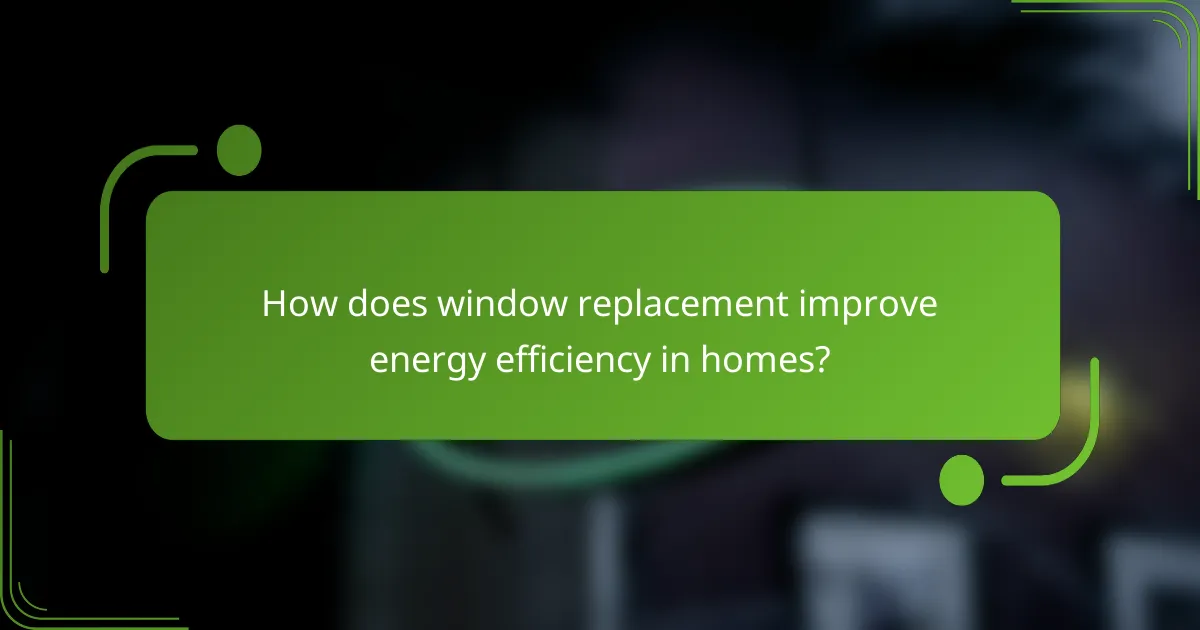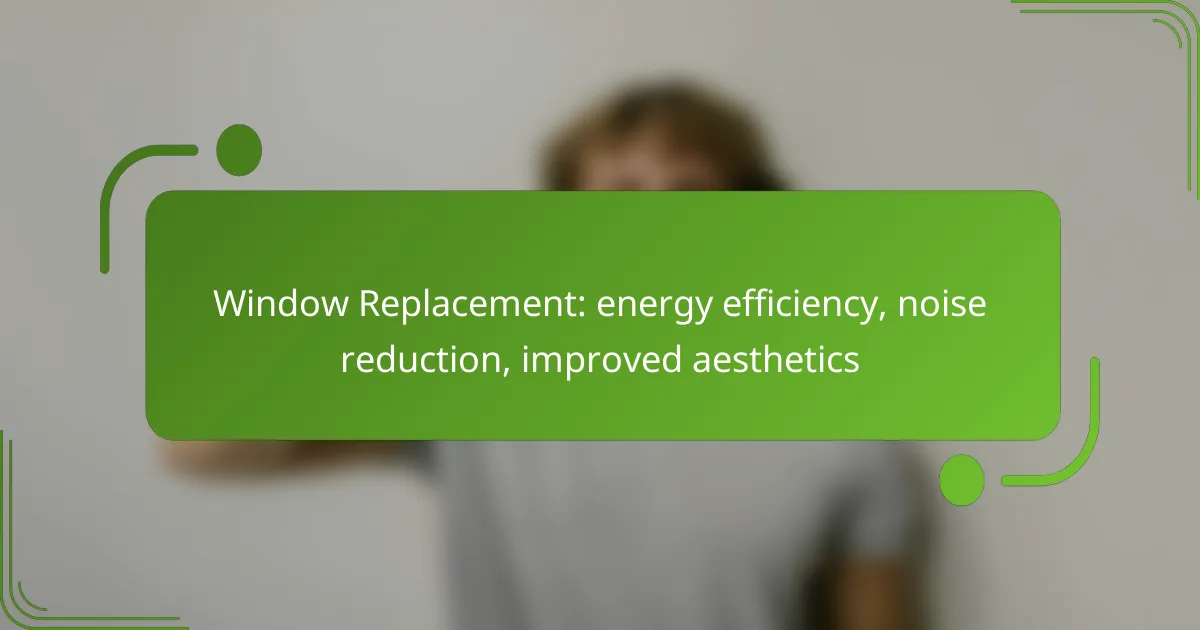Replacing your windows can greatly improve energy efficiency by reducing heat transfer and air leaks, leading to lower heating and cooling costs. Additionally, modern windows offer enhanced sound insulation, minimizing noise pollution for a more tranquil indoor environment. Beyond functionality, new windows also elevate the aesthetics of your home, transforming its appearance and making it more inviting.

How does window replacement improve energy efficiency in homes?
Window replacement significantly enhances energy efficiency by minimizing heat transfer and air leaks, which leads to reduced heating and cooling costs. Modern windows utilize advanced technologies to create a more comfortable indoor environment while lowering energy consumption.
Low-E glass technology
Low-Emissivity (Low-E) glass is designed to reflect heat back into the home during winter and keep it out during summer. This technology utilizes a thin metallic coating, which allows natural light to enter while reducing UV rays that can fade furnishings. Homes equipped with Low-E glass can see noticeable improvements in energy efficiency.
Insulated frames
Insulated window frames are made from materials that provide better thermal resistance compared to traditional frames. Options like vinyl, fiberglass, or wood composites help to minimize heat loss. Choosing windows with insulated frames can significantly reduce energy costs by maintaining a stable indoor temperature.
Energy Star-rated windows
Energy Star-rated windows meet strict energy efficiency guidelines set by the U.S. Environmental Protection Agency. These windows are tested for performance in various climates and can help homeowners save on energy bills. When selecting windows, look for the Energy Star label to ensure you are choosing an efficient option.
Double glazing benefits
Double glazing involves two panes of glass separated by a space filled with gas, which acts as an insulator. This design reduces noise pollution and improves energy efficiency by minimizing heat transfer. Homes with double-glazed windows often experience lower energy bills and increased comfort levels.
Cost savings on energy bills
Replacing old windows with energy-efficient models can lead to significant cost savings on energy bills, often ranging from 10% to 25% depending on the home’s location and existing window condition. While the initial investment may be higher, the long-term savings and increased comfort make it a worthwhile consideration. Homeowners should evaluate their current energy costs to estimate potential savings from window replacement.

What are the noise reduction benefits of window replacement?
Window replacement can significantly reduce noise pollution in homes, enhancing overall comfort. New windows designed for sound insulation can block external noise, making indoor environments quieter and more peaceful.
Acoustic glass options
Acoustic glass is specifically engineered to minimize sound transmission. It typically features multiple layers of glass with varying thicknesses, which disrupt sound waves more effectively than standard glass. Homeowners can choose from laminated or double-glazed options, both of which provide substantial noise reduction benefits.
Sealing techniques
Effective sealing is crucial for noise reduction in window replacements. High-quality weatherstripping and caulking can prevent sound leaks around the window frame. Ensuring a tight seal not only enhances acoustic performance but also improves energy efficiency by reducing drafts.
Frame construction materials
The materials used for window frames can influence their soundproofing capabilities. Vinyl and fiberglass frames generally offer better insulation against noise compared to aluminum frames. Additionally, thicker frames can help absorb sound, further contributing to a quieter indoor environment.
Impact on indoor comfort
Replacing windows with sound-reducing options can greatly enhance indoor comfort. Quieter spaces can lead to improved concentration and relaxation, making homes more enjoyable. Moreover, the reduction in noise can positively impact sleep quality, promoting better overall health and well-being.

How does window replacement enhance home aesthetics?
Window replacement significantly enhances home aesthetics by improving the overall appearance and style of a property. New windows can transform the look of a home, making it more inviting and visually appealing.
Custom design options
Homeowners can choose from a variety of custom design options to match their personal style and the architectural features of their home. Options include different shapes, sizes, and configurations that can complement existing structures or create a unique look. Customization allows for tailored solutions that meet both functional and aesthetic needs.
Consider consulting with a professional to explore design possibilities that align with your vision and local architectural guidelines.
Modern vs traditional styles
When replacing windows, homeowners can opt for modern styles that offer sleek lines and contemporary materials or traditional styles that reflect classic designs. Modern windows often feature minimalistic frames and larger panes, while traditional options may include divided lights and wood finishes. The choice between these styles can significantly impact the overall character of the home.
Evaluate the existing style of your home to ensure that the new windows enhance rather than clash with its architectural integrity.
Color and finish choices
Color and finish choices play a crucial role in the aesthetic appeal of new windows. Options range from neutral tones that blend seamlessly with the exterior to bold colors that make a statement. Additionally, finishes such as matte, gloss, or textured can further enhance the visual impact.
It’s advisable to select colors and finishes that not only suit your taste but also complement the surrounding environment and neighborhood aesthetics.
Impact on property value
Replacing windows can positively impact property value by enhancing curb appeal and energy efficiency. Homes with updated, attractive windows are often more appealing to potential buyers, which can lead to quicker sales and higher offers. The investment in new windows typically yields a favorable return, especially in competitive real estate markets.
Consider the long-term benefits of window replacement as part of your overall home improvement strategy, especially if you plan to sell in the near future.

What factors should be considered when selecting replacement windows?
When selecting replacement windows, consider energy efficiency, noise reduction, and aesthetics. These factors significantly impact comfort, utility costs, and the overall appearance of your home.
Climate considerations in the UK
The UK climate features a mix of wet and temperate conditions, making it essential to choose windows that provide effective insulation and moisture resistance. Double or triple glazing is often recommended to minimize heat loss during colder months and reduce condensation.
Additionally, consider window materials such as uPVC or timber, which can offer varying levels of thermal performance. Selecting windows with a low U-value can enhance energy efficiency, helping to maintain a comfortable indoor temperature year-round.
Building regulations compliance
Replacement windows in the UK must comply with specific building regulations, particularly regarding energy efficiency and safety. The current regulations require that new windows meet minimum energy performance standards, often verified through the Window Energy Rating (WER) system.
Ensure that your chosen windows are certified and that any installation work is carried out by a qualified professional. This compliance not only guarantees safety but can also affect property value and insurance coverage.
Budget and financing options
When budgeting for replacement windows, consider the total cost, including materials, installation, and potential maintenance. Prices can vary significantly, typically ranging from a few hundred to several thousand pounds depending on size, style, and energy efficiency ratings.
Explore financing options such as home improvement loans or government grants that may be available for energy-efficient upgrades. Prioritize quality over cost to ensure long-term savings on energy bills and reduced maintenance expenses.
